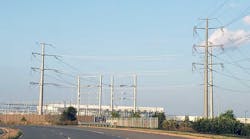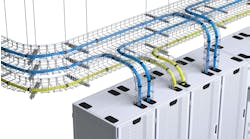The world’s largest data center market is facing a power shortage. Dominion Energy has begun telling data center companies that power for some new facilities in Eastern Loudoun County will be delayed, perhaps for years.
That could slow or halt some development around Ashburn, the most active market for cloud computing infrastructure. The region houses data centers that support Internet hyperscale platforms like Amazon Web Services, Microsoft, Google and Meta, as well as many enterprise companies. There is 26 million square feet of data center space in Loudoun County, with about another 5 million square feet in development, and many more projects in the planning stages.
“Dominion Energy, which is the primary power provider in (Loudoun County), informed its major customers very recently of a potential pinch point in Eastern Loudoun County that could delay deliveries until 2026,” said Andy Power, the President and Chief Financial Officer of Digital Realty, in the company’s earnings call Thursday evening. “The cause has been described to me as transmission, not generation, i.e. the pipes or the power line infrastructure, not the actual power.”
“The power company did not give definitive answers to most of the relevant questions we have, but they have been transparent about the potential issue, and they’re working very diligently to finalize their assessment,” Power said, adding that there “will obviously likely be a slowdown in delivery of new supply in the largest and most consistently in-demand data center market in the world.”
In a statement, Dominion Energy noted the extraordinary growth in the Ashburn cluster.
“The data center industry has grown substantially in Northern Virginia in recent years, and we’ve made significant investments in new infrastructure to meet the growing demand for electricity,” Dominion said. “That growth is now accelerating, which is resulting in transmission constraints in a pocket of eastern Loudoun County that will impact new connections for large customers. This will not impact residential or small business customers.”
The power delays could have an impact on where and when new data centers are built in Northern Virginia, reshaping the map in a strategic hub for cloud infrastructure. If power delays persist in Eastern Loudoun, future development may shift to nearby sub-markets like Leesburg, Prince William County, and Frederick County in Maryland. The news may also prompt competition for the remaining space in Ashburn, which has one of the lowest vacancy rates for data center space in the country.
A slowdown in new development also could have implications for the county budget in Loudoun County, where data centers are expected to create $575 million in tax revenue for the county budget in 2022, or about 31 percent of the county’s revenue. County officials are currently in the process of updating the guidelines for where data centers should be built and what they should look like, and wants industry feedback prior to deciding on new rules in September.
Industry Seeking More Information
An industry group for data center operators said it is seeking more information from Dominion to gauge the impact of the delays.
“The Data Center Coalition is aware of Dominion’s projected transmission challenges in eastern Loudoun County, which are very concerning to the data center industry and its many partners and customers,” said Josh Levi, President of the Data Center Coalition, “While we are gathering additional information to help our members assess the impact on their businesses, the DCC is engaging proactively with Dominion and partners in state and local government to support the determination of the best path forward.”
“We’re only two weeks into the discussions, and are still trying to get a handle on the extent of the challenges we’re facing,” said Buddy Rizer, Executive Director, Loudoun County Department of Economic Development. “We’re going to work with everyone we can to try to figure out what steps we need to take to help deliver for the companies doing business in Loudoun County.”
Dominion Energy said it is seeking “to alleviate the constraints as quickly as possible.”
“We have been actively engaged with our customers and other stakeholders to raise awareness about the issue and discuss solutions,” said the Dominion statement. “We’re committed to meeting our customers’ needs and supporting the continued growth of the region.”
The timetable for additional transmission capacity is not clear. The potential delivery delays have been a topic of discussion at the PJM Interconnection, which coordinates the electric grid in the Eastern United States.
“The Data Center Alley located in northern Virginia in the Dominion Transmission Zone is experiencing unprecedented load growth driven by increases in data center load that started in 2018 and is expected to continue growing post 2027,” PJM said in a July 1 memo. The issues are also highlighted in a July 12 presentation on the “immediate need” for more transmission capacity in some areas area near Dulles Airport.
Potential Impact on New and Existing Space
As cloud computing grows faster than many local utility grids, several of the world’s largest and most strategic data center markets are already facing power constraints that pose a challenge to the long-term growth of the Internet. Data center construction near Dublin has been effectively capped by Ireland’s grid regulator operator, forcing utility EirGrid to halt talks on about 30 proposed projects. Amsterdam, Singapore and Frankfurt have either imposed moratoriums or developed policies to guide data center development.
“Access to reliable energy has been a critical factor in the data center industry’s growth in Northern Virginia and Dominion has historically been an important industry partner.” said Levi. “The Data Center Coalition and its members are committed to working collaboratively with all stakeholders to determine a solution that ensures continued energy reliability for this critically important business sector as it grows to meet increasing demand for cloud and digital solutions from a wide range of customers.”
Digital Realty’s Power told securities analysts that the Ashburn market will continue to thrive, but perhaps with different dynamics.
“We believe there’s still going to be robust demand in a tightened or slowed supply environment,” said Power. “First and foremost, I don’t see people leaving Ashburn for this delay. This isn’t like a permanent feature, this is a bottleneck in a portion of Ashburn. And you’ve got an incredible amount of customers, infrastructures, and network. Ashburn grew to where it is for many reasons, and I don’t see demand just running away in the face of this.”
Many details of the potential delays remain unclear. As more details become available, the availability of data center space in the market will become a competitive advantage, Power said.
“I see two possible outcomes,” he said. “One is greater pricing power and higher rates tied to the sharp reduction of near-term availability, which should be favorable to Digital given our standing in this market. There will also likely be potentially some winners and losers as it relates to the various developers seeking to bring new inventory online in that market.”
Digital Realty is the largest operator in Northern Virginia. Power said the company has about 40 megawatts of available space, 50 megawatts in a new building nearing completion, and capacity for 200 megawatts in a campus in Manassas in Prince William County, and at least 200 megawatts on land with a substation near Dulles Airport.
“I think the available capacity is going to become more precious,” said Power. “The 40 megawatts of operational space that we have today is more precious. And if we’re able to proceed and bring on new capacity that I outlined, that becomes more precious.”






